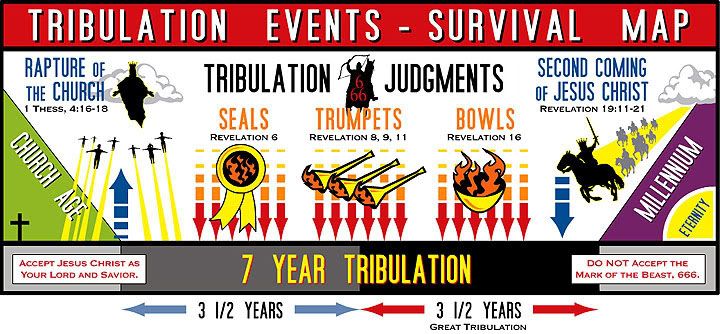
The tribulation, or the rapture are not topics which Catholics hear much about. Often one of Candy's posts on this topic will have Catholics scratching their heads, because they have no idea what she is talking about. Do Catholics believe this, or not?
We have done several posts on the end times here at VTC, mostly centering around the identity of the Whore of Babylon, for obvious reasons. Elena has these on the sidebar, or you can choose the "Whore of Babylon" tag at the bottom of this post.
This post gives several resources for how the early Christians interpreted Revelation.
Joy at Coffee With Candy has a series on the end times, as well.
As far as I have been able to tell, the Catholic Church is amillenial, meaning we do not believe that all of these things which Candy says are going to happen, will happen. There will be a time of tribulation, and then Jesus will return.
From Catholic Answers:
The amillennial view interprets Revelation 20 symbolically and sees the millennium not as an earthly golden age in which the world will be totally Christianized, but as the present period of Christ’s rule in heaven and on the earth through his Church. This was the view of the Protestant Reformers and is still the most common view among traditional Protestants, though not among most of the newer Evangelical and Fundamentalist groups.
Amillennialists also believe in the coexistence of good and evil on earth until the end. The tension that exists on earth between the righteous and the wicked will be resolved only by Christ’s return at the end of time. The golden age of the millennium is instead the heavenly reign of Christ with the saints, in which the Church on earth participates to some degree, though not in the glorious way it will at the Second Coming.
Amillennialists point out that the thrones of the saints who reign with Christ during the millennium appear to be set in heaven (Rev. 20:4; cf. 4:4, 11:16) and that the text nowhere states that Christ is on earth during this reign with the saints.
They explain that, although the world will never be fully Christianized until the Second Coming, the millennium does have effects on earth in that Satan is bound in such a way that he cannot deceive the nations by hindering the preaching of the gospel (Rev. 20:3). They point out that Jesus spoke of the necessity of "binding the strong man" (Satan) in order to plunder his house by rescuing people from his grip (Matt. 12:29). When the disciples returned from a tour of preaching the gospel, rejoicing at how demons were subject to them, Jesus declared, "I saw Satan fall like lightning" (Luke 10:18). Thus for the gospel to move forward at all in the world, it is necessary for Satan to be bound in one sense, even if he may still be active in attacking individuals (1 Pet. 5:8).
This section of the Catechism deals with "From thence He shall come again to judge the living and the dead":
680 Christ the Lord already reigns through the Church, but all the things of this world are not yet subjected to him. The triumph of Christ's kingdom will not come about without one last assault by the powers of evil.
681 On Judgment Day at the end of the world, Christ will come in glory to achieve the definitive triumph of good over evil which, like the wheat and the tares, have grown up together in the course of history.
682 When he comes at the end of time to judge the living and the dead, the glorious Christ will reveal the secret disposition of hearts and will render to each man according to his works, and according to his acceptance or refusal of grace.
3 comments:
Just to let you know, many non-catholics, even some Baptists like mmyself, don't accept the canned pre-millenial tribulation idea that has become accepted in recent years and taught relentlessly.
I don't accept the amillenial view, but I believe the Lord's prophecies should be read earnestly along with all of scripture and then as we see the propeied events unfold, it will build our faith and give us hope through hard times.
I don't necessarily think scripture teaches a 7 year period (thouh it may be)or that the rapture will take Christians out before tribulation begins.
I have noticed in my relationships with catholics and in attending in the past with relatives and reading some catholic books, that Roman Catholics don't stress prophecy and I couln't figure out what they believed about it, as you had mentioned also.
I think some evangelicals put too much emphasis on this canned 7-year tribulation, and catholics don't put enough emphasis on teaching prophecy, as it constitutes much of the Bible.
I think all people who call themselves Christians, including Baptists and Catholics, should examine themselves and their beliefs and practices to see if they are in line with what Christ and the Apostles taught.
Read Revelation 2 and 3 to hear Christ's admonitions to the churches, which can apply to groups and individuals today, and take them to heart.
Jennie
Sorry so many typos in the last comment. I was typing on my laptop while nursing my one-year-old at the same time!
Jennie
Jennie, I do understand that dispensationalism is not universal. We do gear our posts here towards Candy's theological view because the blog deals with Candy.
We have readers from a variety of types of Christianity, so we often have interesting discussions in the comboxes as we share what we each believe.
Post a Comment